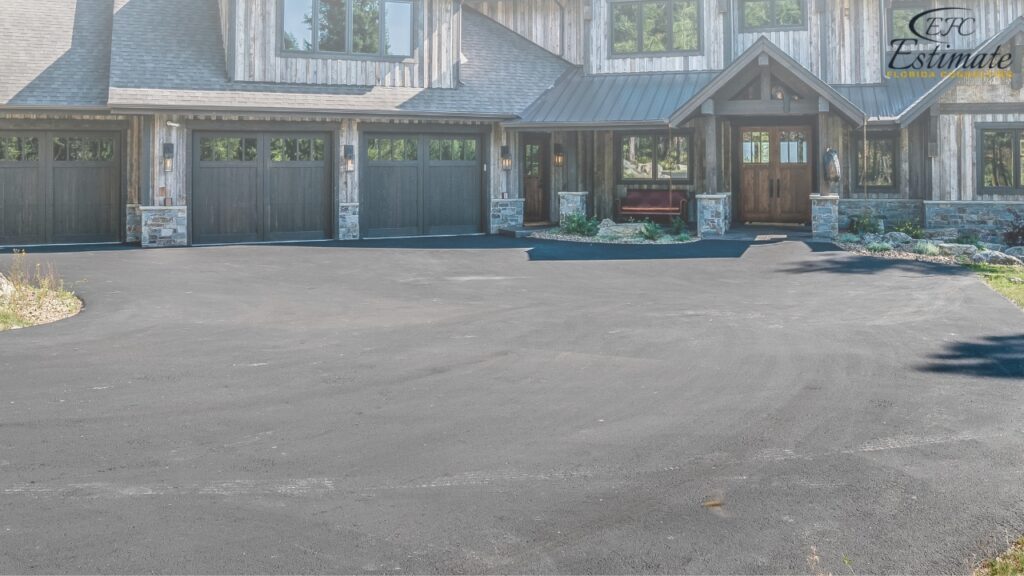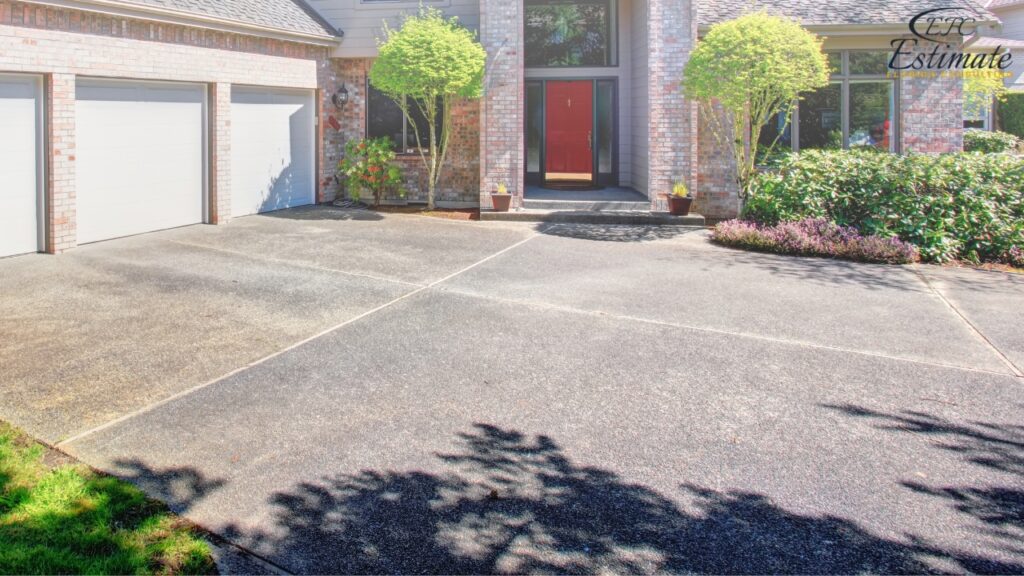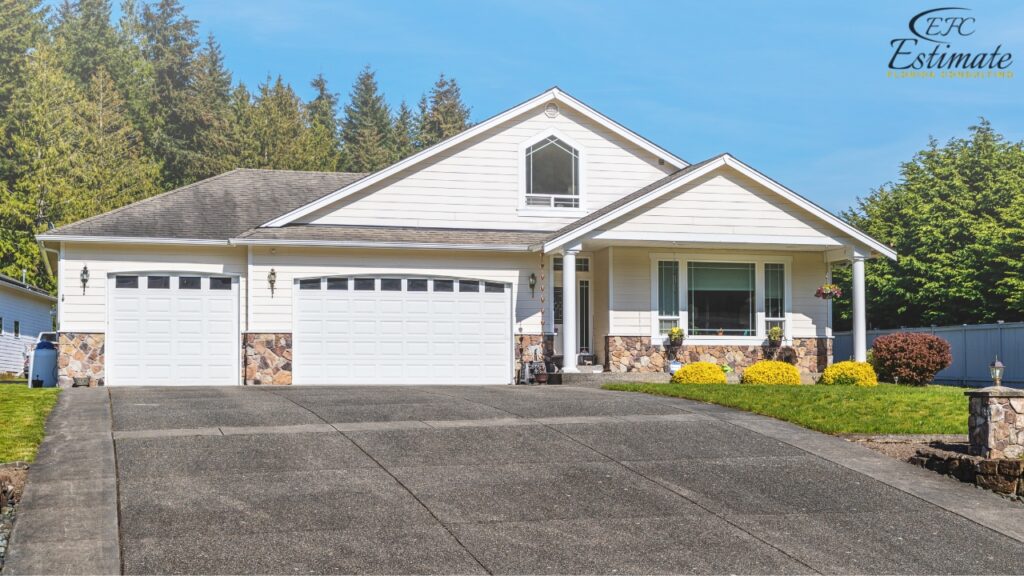How Much Does It Cost To Seal A Driveway?
Sealcoating your driveway can extend its lifespan and shield it from the elements like sun, rain, snow, and oil spills. Not only does it protect the surface, but it also boosts your home’s curb appeal. The cost for driveway sealing typically falls between $358 and $1,066, with the national average being around $709.
On average, labor costs are about $1.50 per square foot, but this can vary depending on where you live. Overall, homeowners can expect to pay between $1.63 and $1.95 per square foot for both materials and labor combined.

When planning to seal your driveway, consider factors that can affect the cost, such as the driveway’s size, the type of sealant used, and any necessary repairs. Additionally, there are ways to save on sealing costs and important questions to ask your sealing contractor to ensure you get the best deal.
Driveway Sealing Cost Breakdown
Sealing a driveway is an excellent way to enhance curb appeal and protect your driveway from sun damage and gasoline spills. Here’s a detailed cost breakdown to help you make an informed decision about your sealing project.
Labor Costs
Labor typically accounts for 50% to 70% of the total cost, averaging around $1.43 per square foot. This means driveway contractors generally charge about $715 for a 500-square-foot driveway and just over $1,300 for a 1,000-square-foot driveway. Note that some contractors may have a minimum labor fee, especially for smaller projects.
Labor costs can vary depending on the project’s complexity, unexpected challenges, and additional services like cleaning and crack repair. It’s always a good idea to get quotes from several local contractors and discuss the specifics of your project.
Materials Costs
The remaining 30% to 50% of the cost comes from materials, primarily the sealant. Sealant prices range from $0.08 to $0.52 per square foot, depending on the type of sealant used. For a 500-square-foot driveway, you’ll need approximately 5 gallons of sealant, which can cost between $52 and $221. This cost assumes a single coat; if multiple coats are needed, the price will double.
Concrete and asphalt driveways generally need sealing every three years, so keep this in mind when budgeting for multiple coats.
Cost by Sealant Type
Here’s a breakdown of the average costs per square foot for different types of driveway sealants:
Type of Sealant | Average Cost per Square Foot |
Fast-drying | $0.13 |
Coal tar | $0.10 |
Asphalt emulsion | $0.12 |
Latex acrylic | $0.29 |
Oil-based | $0.22 |
Fill-and-seal | $0.46 |
The type of sealant you choose impacts both the cost and the results. If you live in an area with extreme temperature changes, it’s worth investing in higher-end formulations to avoid frequent resealing. In more temperate climates, budget-friendly options will suffice. Here’s a breakdown of each type:
Fast-Drying Sealcoating
Fast-drying sealcoating costs around $0.13 per square foot. It dries and cures within 24 hours, saving time, which is ideal if you need to use your driveway quickly. This sealant is more environmentally friendly than some other options, like coal tar, although it does release small amounts of volatile organic compounds (VOCs). The downside is its durability; you’ll need to reseal every two years, which can add to long-term costs. Despite the need for frequent resealing, its quick drying time makes it a popular choice for busy households and commercial properties where minimizing downtime is crucial.
Coal Tar
Coal tar is the most budget-friendly option, costing between $0.10 and $0.13 per square foot. It’s fairly durable, lasting three to four years before needing a reseal, which makes it a cost-effective choice in the short term. However, it contains carcinogens that can pollute soil and water, posing environmental and health risks. The National Cancer Institute has highlighted the dangers of these carcinogens, making it a less appealing option for environmentally conscious homeowners. If you’re on a tight budget and don’t grow produce on your property, this could be a viable option, but it’s important to weigh the potential health and environmental impacts against the cost savings.

Asphalt Emulsion
Asphalt emulsion sealant costs between $0.12 and $0.17 per square foot. It’s popular due to its moderate price and lower environmental impact compared to coal tar. This type of sealant provides a good balance of cost and performance, lasting four years or more before requiring a reseal. However, the installation process is finicky, requiring warm weather (50°F and rising) for proper application. Additionally, it’s highly susceptible to oil and gasoline spills, which can penetrate the sealant and cause damage to the underlying asphalt. Despite these challenges, asphalt emulsion remains a favorite among homeowners for its eco-friendliness and durability.
Latex Acrylic
Latex acrylic is one of the pricier options at $0.29 to $0.42 per square foot. It’s highly resistant to stains and UV rays and non-toxic, making it a safe and durable choice for your driveway. This sealant features a blend of synthetic polymers that hold up well during high temperatures, which is beneficial in hot climates. With basic maintenance, it can last five to ten years, reducing the frequency and cost of resealing. It’s also great for filling deep cracks and medium-sized holes, offering excellent protection and extending the lifespan of your driveway. However, the installation process is challenging and not ideal for DIY projects, so you’ll likely need to hire a professional.
Oil-Based
Oil-based sealants are a good middle-ground option, costing between $0.20 and $0.26 per square foot. They offer decent durability and last around four years, making them a cost-effective choice for many homeowners. Oil-based sealants are less harmful to the environment than coal tar, making this a more eco-friendly option. They are suitable for filling shallow cracks and holes, providing a smooth and durable surface. However, for larger holes, latex acrylic sealant is a better choice due to its superior filling capabilities. Despite their benefits, oil-based sealants can emit VOCs, so it’s important to consider the environmental impact and potential health risks.
Get 5 New Leads Next 7Days With Our System
- Multi-Family Building
- Hotel Building
- Hospital Building
- Warehouse Building
- High-Rise Building
- Shopping Complex
Factors That Affect Driveway Sealing Costs
When estimating the cost of sealing your driveway, several factors come into play beyond just labor, materials, and location. Here are some key considerations:
Driveway Size
The size of your driveway is a primary determinant of the sealing cost. Larger driveways require more materials and labor, increasing the overall price. Materials typically cost between $0.08 and $0.52 per square foot. For a standard 500-square-foot driveway, you’ll need about 5 gallons of sealant. If your driveway is 1,000 square feet, the cost for materials alone can double. With a 30% cost increase, expect to pay between $0.10 and $0.68 per square foot for materials.
Additional Coats
Applying an extra coat of sealant can significantly enhance the durability and lifespan of your driveway, protecting it from extreme weather and wear-and-tear. However, this also means paying for additional labor and materials, essentially doubling the cost. Some contractors might offer discounts for multiple coats, so it’s worth discussing your options with them. With a 30% increase, the additional coat will further raise the overall expense.
Affiliated Repairs
Before sealing, you must repair any existing damage like holes, cracks, and chips. Certain sealants, such as fill-and-seal and latex acrylic, can address small imperfections, but more significant repairs will require professional help. Driveway repair costs range from $2.60 to $5.20 per square foot, depending on the extent of the damage. Minor repairs might cost around $390, while severely damaged driveways could run up to $6,500. In cases of extreme damage, it may be more cost-effective to repave the driveway entirely, with new paving costing between $2,600 and $9,100.
Additional Costs and Considerations for Sealing a Driveway
When sealing a driveway, there may be extra costs and factors that can impact the overall estimate. While these don’t affect everyone, it’s important to be aware of potential hurdles.
Professional Cleaning
If your driveway needs to be cleaned before applying the sealant, the cost of your project will increase based on hourly labor rates. Some contractors include a post-job power wash in their service, while others charge extra. If an additional fee is required, expect to pay around $0.26 to $0.52 per square foot for power washing. In some cases, your driveway contractor might refer you to a separate pressure washing company.
Sealing Nearby Areas
Consider extending the sealing project to other areas of your property. If the contractors are already there, you can save money by having them seal concrete pathways, patios, asphalt decks, or other similar surfaces. Most contractors charge an initial service fee of $130 to $260, regardless of the job size, so combining multiple sealing jobs into one visit can be cost-effective.
Aesthetic Enhancements
There are various aesthetic enhancements you can add to your driveway, such as stamping custom designs or dyeing the surface a different color. These projects will increase the cost of a standard sealing job and are typically completed before the sealant is applied. For instance, applying a pigment dye can cost between $0.33 and $0.65 per square foot.
Why Do You Need to Seal a Driveway?
Sealing your driveway is crucial for its longevity and maintenance. Regular upkeep ensures your driveway stays in optimal condition for years. Here’s why sealing your driveway is essential:
Protection
One of the main reasons to seal your driveway is to protect it from the elements. Sealing involves applying a protective layer that acts as a barrier against environmental factors such as weather changes, UV rays, and other potential sources of damage. This protective layer helps prevent cracks, deterioration, and structural damage, thereby enhancing the driveway’s durability and lifespan.
Curb Appeal
Sealing your driveway also significantly improves your home’s curb appeal. A sealed driveway looks polished and well-maintained, adding to your home’s overall visual appeal. This enhancement is particularly important for making a good impression on visitors or potential home buyers. In addition to the practical benefits, a sealed driveway contributes to the aesthetic beauty of your property.
Extend Driveway Lifespan

Sealing your driveway is a proactive measure that can greatly extend its lifespan. By sealing the asphalt or concrete, you prevent moisture, oils, and other substances from penetrating and causing damage over time. This preventive step not only stops deterioration but also strengthens the driveway’s structural integrity. As a result, a sealed driveway is more resistant to environmental factors, reducing the likelihood of cracks and ensuring a longer, more durable lifespan for the pavement.
How Often Should You Seal Your Driveway?
The frequency of sealing your driveway depends on several factors, including the type of sealant used, the local climate, and the amount of traffic the driveway endures. Generally, it’s recommended to seal your driveway every two to five years.
For asphalt driveways, a good rule of thumb is to reseal every two to three years. This helps maintain the protective layer and keeps the driveway in good condition.
If you live in an area with extreme weather conditions, such as very hot summers or frequent freezing and thawing in winter, you may need to seal your driveway more often. High traffic areas also wear out faster, so keep an eye out for signs of wear, fading, or cracks. Addressing these issues promptly by resealing can help maintain the driveway’s protection and extend its lifespan.
5 Ways to Save Money on Driveway Sealing
Everyone loves saving money, so here are some tips to help reduce the cost when resealing your driveway:
1. Keep Up with Maintenance
Perform basic maintenance tasks between resealings to improve the durability and lifespan of your driveway. Clean up gasoline stains promptly and patch small cracks before they become bigger problems. Regular upkeep can save you money by preventing costly repairs down the line.
2. Gather Multiple Quotes
Contact at least three professionals before choosing a contractor. This not only allows you to compare prices but also lets you read more customer reviews. The cheapest quote isn’t always the best option, as it might lead to higher costs in the long run. Do your research and select a contractor who offers a good balance of quality and price.
3. Don’t Automatically Choose the Cheapest Sealant
When selecting a sealant, consider factors like your location and local weather conditions instead of just going for the cheapest option. A more expensive, high-quality sealant might last longer, meaning you won’t need to reseal as frequently, which can save you money over time.
4. Look for Off-Season Deals
Talk to contractors about off-season deals to save some money. You might find better prices when the weather is changing or if you book a job for mid-week. Contractors often have lower rates during less busy times.
5. Do Some of the Work Yourself
While sealing a driveway isn’t a highly DIY-friendly task, there are still some things you can do to cut costs. Clean your driveway before the contractor arrives and patch minor cracks and holes yourself. These small efforts can reduce the billable labor hours and save you money.
DIY Driveway Sealing vs. Hiring a Professional
Sealing a driveway isn’t the easiest job for a DIYer, especially if you’re inexperienced. The task requires a significant amount of sealant (at least 5 gallons) and specialized tools to ensure a quality finish. While you could use standard hand tools, commercial equipment makes the job faster and results in a more durable and long-lasting seal.
If you’re determined to do it yourself, remember to consider the weather. You’ll need three consecutive days without rain and temperatures between 50 and 95 degrees Fahrenheit. This means that winter isn’t a practical time for sealing a driveway in most parts of the country.
While DIY can save money upfront, hiring a professional might be more cost-effective in the long run due to their expertise, efficiency, and access to the right equipment. A professional job can ensure a better finish, fewer mistakes, and a driveway that lasts longer.
Download Template For Driveway Project Breakdown
- Materials list updated to the zip code
- Fast delivery
- Data base of general contractors and sub-contractors
- Local estimators

Conclusion
Sealcoating your driveway is a smart investment to extend its lifespan and protect it from environmental damage such as sun, rain, snow, and oil spills. Besides preserving the surface, it enhances your home’s curb appeal. The cost for driveway sealing generally ranges from $358 to $1,066, with a national average of around $709. Labor costs average about $1.50 per square foot but can vary by location. Homeowners can expect to pay between $1.63 and $1.95 per square foot for both materials and labor combined. Consider factors like driveway size, type of sealant, and necessary repairs when planning your project to ensure you get the best deal.
FAQs
The cost for driveway sealing typically ranges from $358 to $1,066, with the national average being around $709.
On average, labor costs about $1.50 per square foot, but this can vary depending on your location.
Homeowners can expect to pay between $1.63 and $1.95 per square foot for both materials and labor combined.
Factors include the driveway’s size, the type of sealant used, and any necessary repairs. It’s also important to get quotes from several contractors.
Labor typically accounts for 50% to 70% of the total cost, averaging around $1.43 per square foot. This means contractors generally charge about $715 for a 500-square-foot driveway and just over $1,300 for a 1,000-square-foot driveway.
Materials make up 30% to 50% of the cost, with sealant prices ranging from $0.08 to $0.52 per square foot. For a 500-square-foot driveway, expect to need around 5 gallons of sealant, costing between $52 and $221 for a single coat.
Google Reviews



Process To GetIt Cost To Seal A Driveway Estimate Report
Here I am going to share some steps to get it cost to seal a driveway estimate report.
-
You need to send your plan to us.
You can send us your plan on info@estimatorflorida.com
-
You receive a quote for your project.
Before starting your project, we send you a quote for your service. That quote will have detailed information about your project. Here you will get information about the size, difficulty, complexity and bid date when determining pricing.
-
Get Estimate Report
Our team will takeoff and estimate your project. When we deliver you’ll receive a PDF and an Excel file of your estimate. We can also offer construction lead generation services for the jobs you’d like to pursue further.

